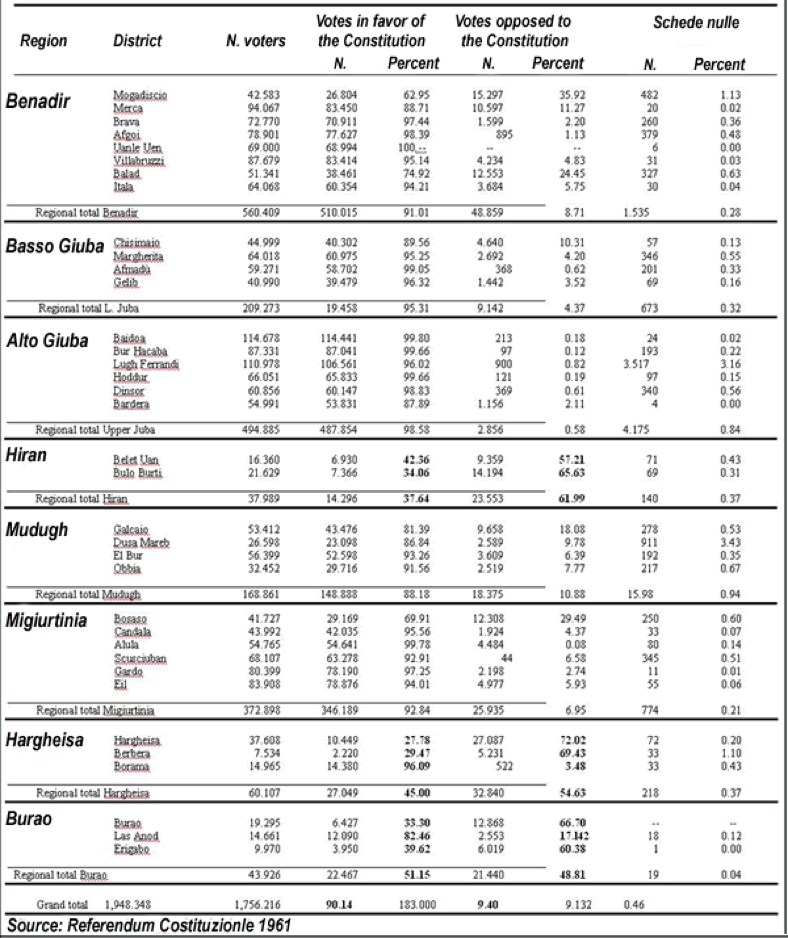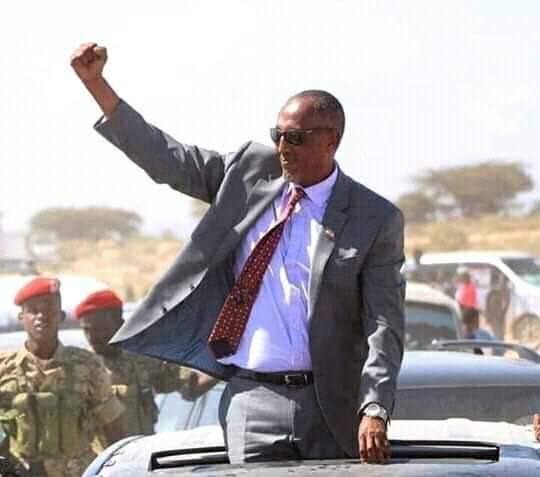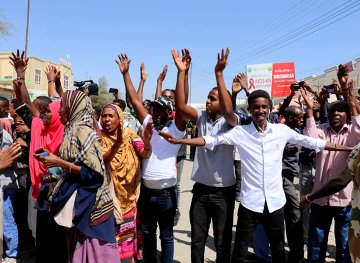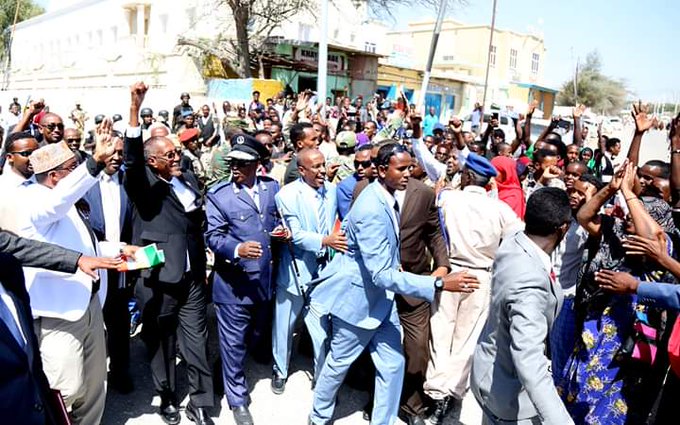His Excellency the President of the Republic of Somaliland, Musa Bihi Abdi, ruled out a reunion with Somalia but promises other forms of bi-lateral cooperation once Somalia meets certain prerequisites.
The President, addressing a joint session of Somaliland’s bicameral Parliament in his State of the Union yearly address, said it was time Somalia realized the only way forward between cooperation between the two erstwhile partners was for Somalia to fully acknowledge the Republic of Somaliland’s right to restore its sovereignty from a failed, ill-fated union which denied his country its share of power and resources for over 30 years. Another 30 years are about to relapse since 18 May 1991 when the reaffirmation was proclaimed in a grand conference in Burao.
“Once Somalia accepts Somaliland’s inalienable right to self-determination, fully recognizing it as a sovereign state, cooperation and brotherly relations are possible,” he said.
The President, however, showed that, given a number of inimical measures President Farmajo and his government have undertaken against Somaliland since he came to power in 2017, he placed not a great confidence in Somalia and its president realizing their follies and blunders which only exacerbated the growing, frosty relations between the two erstwhile partners.
Farmajo on the Offensive
President listed five of them.
The Somalia which Farmajo leads, he stated:
- Openly waged a war of attrition against any development initiative benefitting Somaliland and its people such as the Berbera port development;
- Attempted to reverse the Somaliland Special Arrangement to channel in aid programmes;
- Sequestered to itself all aid funds garnered in the name of a non-existent, phantom ‘Somalia’ state including scholarships, economic interventions and security and armed forces international, technical support;
- Failed to implement agreements between the two sides born of the talks between the two sides such as the airspace management provisos signed by presidents Ahmed Siilaanyo and Hassan Sheikh Mohamoud;
- The recent attempt to stop the Hajj season livestock export from Berbera;
- Mounting diplomatic and propaganda offensive against any nation that accords an honourable reception to the Republic of Somaliland and its leaders such as that which it had barraged Guinea-Conakry with.
Speaking of a viral rep[ort that the Prime Minister of Ethiopia Abiy Ahmed was pushing for a visit to Somaliland towing President Farmajo in an attempt to use all possible influence to force an unlikely rapport between the two sides, the President, again, emphatically ruled the possibility.
“It is neither humanly logical nor governmentally feasible that a president whose country is guilty of widespread genocide and persecutions visit a victim country without further ado,”e said.
The only way”, he pointed, “that a probability of such a visit could be entertained was if the offending country atoned for its crimes, and in the case of Somaliland, recognized the country’s right to its restored sovereignty”.
President, to strike his point home, signed it with verses immortalized by time and changing situation by a Farah Nur, a famous poet of the 20th century:
False smiles, bared teeth, and Justification Whose aim I am fully conversant with;
A pit whose mouth is covered and its deep bottom concealed;
Only an imbecile would lay his neck where it was to be chopped off;
None can trick me with concealed daggers to slaughter me with;
Since wounds are still festering, not healed, what kind of fickle peace could be affected;
Relations are severed and irreversible, and as such you must accept that finality
With that clear note, President Musa Bihi sent out the nation’s message to Federal Somalia, to President Farmajo, to PM Abiy Ahmed and to the world at large.
Situation Backdrop
President Farmajo, as his leadership stands at present, cannot set foot in at least three of his federal states which he alienated with a kind of dictatorial subjugation. He cannot visit Galmudug, Jubaland or Puntland let alone a Republic of Somaliland that is a country which is way ahead of his in more ways than one.
Only in Hirshabelle and Southwest federal states he is in communication with – two places where he installed puppet figureheads and he can only foray out of his fortified office shepherded by heavy AMISOM escort in a string of armoured vehicles and personnel carriers.
President Farmajo cannot visit the two nearest towns on either side of the capital, Bal’ad and Jowhar, only 30 kilometres distant. If he tries he can only do so again with advance divisions of AMISOM and SNA troops with him not risking land travel but taking, again, an AMISOM helicopter.
It is at this backdrop that President Farmajo, to shore up his fast debilitated image and hollow, own media-fanned ‘achievements’, he tried to score points with a more mature, more vigilant Somaliland whose public guard their hard-earned sovereignty at a high cost.
Fake Union
In anticipation of a union of five Somali states (Somalia, Somaliland, NFD, Had & reserve Area and Djibouti), the first two who have attained independence merged. Somaliland at the time was recognized by over 35 states including members of the UN Security Council finally raising its own flag on 26 June 1960 – five good days before Italian Somalia got free. Somaliland, by doing so, put 73 years under Great Britain as a Protectorate (as opposed to Somalia which was an Italian colony before 1950) behind it.
Somaliland did not rush to Mogadishu unprepared. It had a well-put-together Constitution, a legislative Assembly, a Prime Minister and a council of ministers. The intention was that Somaliland and Somalia constitutions be compared, amalgamated and passed once all resource and power shares were identified and signed by representatives of the two governments before tabling to a joint assembly. It never happened.
Reneging Somalilander officers attempted to wrench back their country from yawning, dominating chasm in 1961. The coup was foiled and twenty-three officers were arrested and put behind bars for over two years only to be released in 1963 for the absence of a union law or other bilateral agreement violated.
|
1. 2nd Lt. Hassan-Kayd Abdulle Walanwal 2. 2nd Lt. Abdullahi Mohamed Adan ‘Comgo’ 3. 2nd Lt. Muhumad Abdullahi Rooble 4. 1st Lt. Faisal Haji Jama 5. 1st Lt. Hussein Ali Duale (Ambassador Awil) 6. 1st Lt. Ahmed Haji Derie 7. 1st Lt. Ali Harun 8. 1st Lt. Mohamed Sheikh Musa 9. 1st Lt. Abdi Yussuf Abukar 10. 1st Lt. Mohamed Abdirahman Haji Jama ‘Luggooyo’ 11. 1st Lt. Hussein Mohamed Bullale 12. 1st Lt. Abdullahi Abdi Farah 13. 1st Lt. Mohamed Mohamoud Raghe 14. 1st Lt. Abdullahi Saeed Abby 15. 1st Lt. Mohamed Mohamoud Saeed 16. 1st Lt. Yussuf Ahmed Kibar 17. 1st Lt. Saeed Ogleh 18. 1st Lt. Saeed Ali Geir 19. 1st Lt. Abdi Dhala’ Abdi 20. 1st Lt. Abdikarim Ashur 21. 1st Lt. Abdi-Habashi Ali Hussein 22. 1st Lt. Mohamed Warsame 23. Daud Ali Yahye |
Somalia, setting the pace, took the presidency, the premiership, the Chief Justice, the Chief of Staff, the House Speaker, the Police Commander, Finance ministry, Foreign, and almost all important positions. Only four ministers represented Somaliland. It got 33 out of 123-seat parliament which made decisions go one-way street.
Again, during the same year, to force a compulsory union, Somalia leaders organized a rigged ‘referendum which pitted 6 Somalia regions against only two of Somaliland for Somalia turned its pre-independence districts into regions where it reduced the six Somaliland major cities into districts lumped together under two regions.
Even then, the cumulative voice of Somaliland rejected the union. But it was not heeded since their vote was unfairly juxtaposed against that of over 24 Somalia ‘districts’ a great number of whose votes were rigged.
Military Takes Over
The limping, illegitimate ‘merger’ was, to Somaliland’s possible advantage, brought to an abrupt end by a military coup d’tàt led by another Somaliland, General Mohamed Siad Barre.
His reign started targeting Somaliland right after the 1977 war with Ethiopia ended. He, on plan, resettled over 400 000 Somali-Ethiopian refugees across the then northern regions. He, then systematically started persecuting local residents in a plan to cleanse the area of their influence and numbers. People were regularly arrested arbitrarily, their properties impounded, their women raped and turned to harems, officers culled, expelled or thrown in dungeons.
To challenge the injustices and save what was left of the former Protectorate’s integrity, the SNM was founded in 1981.
Confrontations between the regime and the freedom fighters ended in victory to the latter in January 1991 but after a costly legacy: 50 000 civilians mowed down, cities destroyed by the air force and artillery, over 300 000 refugees finding shelter in Ethiopia and an equal number fleeing to all corners of the world.
It is after 30 more years of reconstruction and successful governance with over sic one-person-one-vote elections that Farmajo who has to achieve yet one-hundredth of what Somaliland achieved alone and without the international community’s billions of aid, debt relief, loans, diplomatic recognition, security and a myriad of other pampering interventions wishes to step onto on an Abiy Ahmed magic carpet.
The Somaliland of today is accountable to its public since it was elected. Somalia, after 30 years, since the dictator was ousted, is not. Its leaders are ‘selected’ by a handful of greased palms behind barricaded doors not elected.
The Somaliland of today, politicians state, is not that of 1960. It will demand and get what it lost to Somalia for over 6o years: embassies, gold, resources, etc. etc.
The should – and must – sit up and realize the unforgivable injustice it continues to mete out on the people of Somaliland – people who cannot enter into bilateral or multilateral agreements, cannot borrow from international financial institutions, cannot claim its rightful seat at the UN, the AU and other forums – and all because it is supporting an impostor in Mogadishu.









































